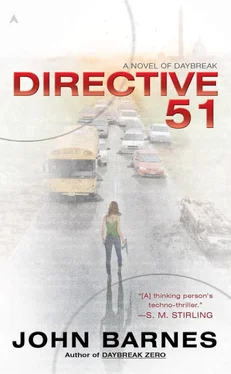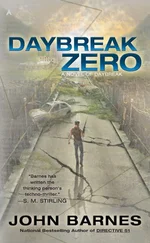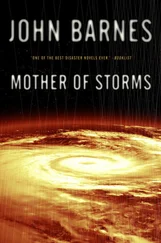ABOUT FIVE HOURS LATER. WASHINGTON. DC. 4:30 P.M. EST. THURSDAY. NOVEMBER 7.
Chris Manckiewicz saw the plane taking off from Reagan National late in the afternoon and trotted over to the White House. In Norcross’s open administration, all he had to do was ask: DRET had gone to Fort Benning.
That night, at dinner, after people read their stories aloud and everyone voted and argued about what should go in at what length, just at the dessert course when people tended to miss Rusty the most, he said, “All right, new business— big new business. Let me lay this out for you. Our new president has sent one Cabinet Secretary, the NCCC, and his most-consulted, most-used, working-on-the-most-important-stuff group of advisors to one of the best-functioning surviving military bases. Does anyone besides me see what this probably implies?”
“Favors for his strong constituency down South,” George Parwin said, in his usual tone of dismissal.
“Not the way I read it, George. Will Norcross is not purely venal and he’s smart enough to know he can’t afford to be perceived that way. So I don’t believe he’d severely inconvenience himself by moving his key advisors out of easy range just to rake in graft or pick up votes in elections that might never be held. I think what he’s doing is sending a continuity team outside the city.”
“You mean he thinks he might lose Washington ?”
“Put it together. He’s sending one guy in the line of presidential succession, the guy whose job would be to make sure that the succession goes in an orderly way, and the team of advisors behind our present policy—to one of the best-defended sites on the continent.”
“You read a lot of stuff into things,” Hayley said. “My turn for dishes, and my vote is we don’t change anything we’re doing.” She stood and gathered plates.
Man, I miss Rusty. I’d’ve made her see sense and she’d’ve made them see it, I just know that. “Here’s what I was thinking. I think some of us should go down to that area to establish a new paper there. One linked to the Advertiser-Gazette , of course, and sharing stories, but I think they’ve just made Columbus, Georgia, an important city—”
“Where’s that?”
“It’s where Fort Benning is,” Chris said, trying not to think you idiot loudly enough to be heard, “and we need a bureau there, and that bureau should be self-supporting—meaning it puts out its own paper. So I was wondering if anyone wanted to volunteer?”
The stares at him were blank. “We’re barely weeks old, Chris,” Don Parmenter said. “We’re just getting people to read papers again. That just sounds to me like spreading ourselves too thin.”
Okay, Plan B. “What if I were to turn my interest in the paper over to you all—we can figure out who gets what shares—and keep maybe five percent, not enough for control or to matter much, and then go set up my own paper down in Georgia? With some kind of guarantee that you’d pay me for any stories I sent you, that you used, and I could buy content from you? ”
“I think you’re re-inventing the AP.”
“Well, it’s gone, and we’re a newspaper. Shortly to be two newspapers, with more to follow. We need an AP. It makes some sense, you know?”
“It does,” George conceded. “What worries me is that you’ll get a hundred miles south, realize how crazy you were, and come home and want your paper back.”
“Word of honor, I won’t do that. If I get a major attack of regret, I’m going to want to keep moving toward Georgia, anyway, because I’m sure not going to want to come back here and face you guys. You’re not the nice types who would give me my newspaper back and never say anything about it, you know?”
“You bet we’re not.”
That night’s production work was combined with a sort of farewell party. Chris had more to drink than he intended and gently fended off a couple of friendly offers from staffers who thought they might not mind a good-bye tumble with the ex-boss. He shook Parwin’s hand, and they drafted documents that everyone witnessed, and the next morning, for the first and only time, he was privileged to be the last one up; most of them were already out on assignment by the time he arose.
ABOUT THE SAME TIME. REAGAN NATIONAL AIRPORT. WASHINGTON. DC. 4:30 P.M. EST. THURSDAY. NOVEMBER 7.
Because she was with Lenny, Heather was able to hook a ride on a biohazard Hummer to Reagan National, and they had more time to go through the antiseptic scrubs and degaussing, and for Lenny and the technicians to figure out how they could kill any nanoswarm that might be on him without destroying internal electronics that kept him alive. Eventually Heather claimed a bench inside the transport, next to where Lenny tied down his wheelchair, and they napped and cuddled, holding hands and occasionally muttering “I love you,” or “I’m glad you’re here” at each other.
“Wake up, sleepyheads.”
Heather sat up; Arnie and Allie were there, with Graham, and Sherry, who was practically beaming. “Hey, you’re not getting rid of me that easily. You’re who I want to be when I grow up.”
“Oh, god, I don’t even know who I’m going to be when I grow up. So did they get all the volunteers and assistants onto the planes?”
“Yep,” Graham said. “And all the families for everyone. Tight squeeze, but we’re all making it. It’ll probably smell way too much like us by the time the flight is done, but we’ll all be there, and apparently the commanding general at Benning, Norm McIntyre, is some kind of old buddies with Cameron and going out of his way to make us welcome.”
Lenny stretched and yawned, then put his hand on Heather’s arm. “To tell you the truth, I’m probably a coward or something, but I’ll be just as glad to get away from DC. It does feel like living in a bull’s-eye, and I’m not convinced the serious rioting is over with.”
“Not to mention Benning has occasional electricity and better access to hot water,” Allie said. “And compared to DC, a lot less freezing our asses off this winter.”
They set their newly decontaminated gear down and packed in close, making room for the many other little knots and balls of coworkers, families, and whatever other ways people had assorted themselves for the trip.
Flying through the early night, they all took turns at looking out the window to see America by night, from the air, with only candle, bonfire, and lamp light. Probably fewer than a thousand people had ever seen such a thing; and very likely, not many more would, perhaps ever.
Every new life begins with division: the fertilized cell splits, and the split parts split, and the split parts split again, until there is a ball of identical cells, the blastula. In the beginning there is division.
The new world grew and divided and divided again. In the next two weeks, the electric power system collapsed completely as the nanoswarm destroyed components for the control systems; biotes ate insulation and shelter; and wrecked transportation, bandits, and riots kept anyone from reaching substations and power lines. As late as November 15th, perhaps one in twelve homes had electricity; nearly everyone listened to President Norcross’s Thanksgiving prayer broadcast on an unpowered crystal set, or using carefully hoarded batteries, by candle or lamplight.
By the last week in November, Detroit, Louisville, Buffalo, Kansas City, Jacksonville, Chattanooga, and Sacramento had all suffered catastrophic fires like the first ones in St. Paul, Boston, and Chicago, spreading for many blocks, with firefighters powerless. No one knew how many died; no one looked for bodies in the rubble.
Читать дальше












